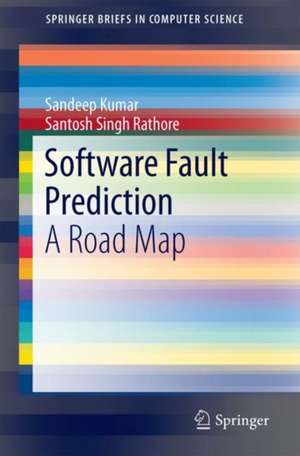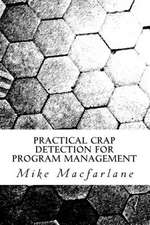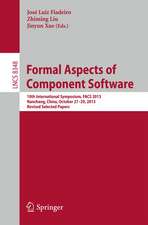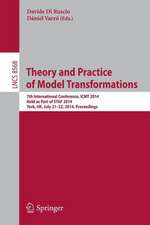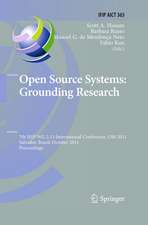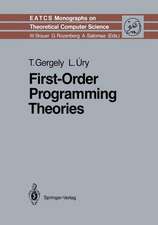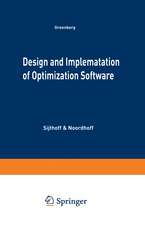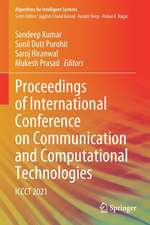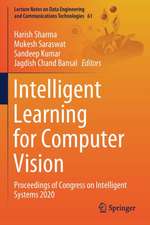Software Fault Prediction: A Road Map: SpringerBriefs in Computer Science
Autor Sandeep Kumar, Santosh Singh Rathoreen Limba Engleză Paperback – 18 iun 2018
The book will beof immense benefit to all readers who are interested in starting research in this area. In addition, it offers experienced researchers a valuable overview of the latest work in this area.
Din seria SpringerBriefs in Computer Science
-
 Preț: 475.83 lei
Preț: 475.83 lei - 20%
 Preț: 166.97 lei
Preț: 166.97 lei - 20%
 Preț: 325.63 lei
Preț: 325.63 lei - 20%
 Preț: 302.49 lei
Preț: 302.49 lei -
 Preț: 381.81 lei
Preț: 381.81 lei -
 Preț: 446.47 lei
Preț: 446.47 lei - 20%
 Preț: 296.17 lei
Preț: 296.17 lei - 20%
 Preț: 335.66 lei
Preț: 335.66 lei - 20%
 Preț: 463.83 lei
Preț: 463.83 lei - 20%
 Preț: 323.00 lei
Preț: 323.00 lei - 20%
 Preț: 322.35 lei
Preț: 322.35 lei - 20%
 Preț: 321.85 lei
Preț: 321.85 lei - 20%
 Preț: 232.68 lei
Preț: 232.68 lei -
 Preț: 375.45 lei
Preț: 375.45 lei - 20%
 Preț: 323.00 lei
Preț: 323.00 lei - 20%
 Preț: 322.81 lei
Preț: 322.81 lei - 20%
 Preț: 324.17 lei
Preț: 324.17 lei - 20%
 Preț: 323.00 lei
Preț: 323.00 lei - 20%
 Preț: 322.17 lei
Preț: 322.17 lei - 20%
 Preț: 322.50 lei
Preț: 322.50 lei - 20%
 Preț: 323.34 lei
Preț: 323.34 lei - 20%
 Preț: 324.17 lei
Preț: 324.17 lei - 20%
 Preț: 323.46 lei
Preț: 323.46 lei - 20%
 Preț: 322.17 lei
Preț: 322.17 lei - 20%
 Preț: 322.02 lei
Preț: 322.02 lei -
 Preț: 341.50 lei
Preț: 341.50 lei - 20%
 Preț: 324.49 lei
Preț: 324.49 lei -
 Preț: 344.47 lei
Preț: 344.47 lei -
 Preț: 376.80 lei
Preț: 376.80 lei -
 Preț: 377.18 lei
Preț: 377.18 lei - 20%
 Preț: 324.17 lei
Preț: 324.17 lei - 20%
 Preț: 352.26 lei
Preț: 352.26 lei - 20%
 Preț: 321.32 lei
Preț: 321.32 lei - 20%
 Preț: 322.17 lei
Preț: 322.17 lei - 20%
 Preț: 324.17 lei
Preț: 324.17 lei - 20%
 Preț: 322.02 lei
Preț: 322.02 lei -
 Preț: 374.46 lei
Preț: 374.46 lei - 20%
 Preț: 320.21 lei
Preț: 320.21 lei - 20%
 Preț: 323.34 lei
Preț: 323.34 lei - 20%
 Preț: 324.17 lei
Preț: 324.17 lei - 20%
 Preț: 231.84 lei
Preț: 231.84 lei - 20%
 Preț: 294.97 lei
Preț: 294.97 lei - 20%
 Preț: 322.50 lei
Preț: 322.50 lei - 20%
 Preț: 323.46 lei
Preț: 323.46 lei -
 Preț: 374.08 lei
Preț: 374.08 lei -
 Preț: 408.23 lei
Preț: 408.23 lei - 20%
 Preț: 321.52 lei
Preț: 321.52 lei - 20%
 Preț: 323.34 lei
Preț: 323.34 lei - 20%
 Preț: 323.00 lei
Preț: 323.00 lei
Preț: 349.15 lei
Preț vechi: 436.43 lei
-20% Nou
Puncte Express: 524
Preț estimativ în valută:
66.83€ • 72.62$ • 56.17£
66.83€ • 72.62$ • 56.17£
Carte disponibilă
Livrare economică 31 martie-14 aprilie
Livrare express 14-20 martie pentru 20.82 lei
Preluare comenzi: 021 569.72.76
Specificații
ISBN-13: 9789811087141
ISBN-10: 9811087148
Pagini: 117
Ilustrații: XI, 72 p. 8 illus., 1 illus. in color.
Dimensiuni: 155 x 235 mm
Ediția:1st ed. 2018
Editura: Springer Nature Singapore
Colecția Springer
Seria SpringerBriefs in Computer Science
Locul publicării:Singapore, Singapore
ISBN-10: 9811087148
Pagini: 117
Ilustrații: XI, 72 p. 8 illus., 1 illus. in color.
Dimensiuni: 155 x 235 mm
Ediția:1st ed. 2018
Editura: Springer Nature Singapore
Colecția Springer
Seria SpringerBriefs in Computer Science
Locul publicării:Singapore, Singapore
Cuprins
Chapter 1. Introduction.- Chapter 2. Software Fault Prediction Process.- Chapter 3. Types of Software Fault Prediction.- Chapter 4. Software Fault Dataset.- Chapter 5. Evaluation of Techniques for Binary Class Prediction.- Chapter 6. Number of Fault Prediction.- Chapter 7. Conclusions.
Notă biografică
Dr Sandeep Kumar is currently working as an Assistant Professor at the Department of Computer Science and Engineering, Indian Institute of Technology (IIT) Roorkee, India. His areas of interest include Semantic Web, Web Services, and Software Engineering. He has supervised many Ph.D. students and filed two patents for his work done along with students. He is currently handling multiple national and international research/consultancy projects and has many accolades to his credit—Young Faculty Research Fellowship of MeitY (Govt. of India), NSF/TCPP early adopter award-2014, 2015, ITS Travel Award 2011 and 2013 and others. He is a member of the ACM and senior member of the IEEE. His name has also been listed in major directories such as Marquis Who’s Who, IBC and others.
Dr Santosh Singh Rathore is currently working as an Assistant Professor in the Department of Computer Science and Engineering, National Institute of Technology (NIT) Jalandhar,India. He received his PhD degree from the Indian Institute of Technology Roorkee (IITR) and his master’s degree (M.Tech.) from the Indian Institute of Information Technology Design and Manufacturing (IIITDM) Jabalpur, India. His research interests include Software Fault Prediction, Software Quality Assurance, Empirical Software Engineering, Object-Oriented Software Development and Object-Oriented Metrics. He has published research papers in various peer-reviewed journals and international conference proceedings.
Dr Santosh Singh Rathore is currently working as an Assistant Professor in the Department of Computer Science and Engineering, National Institute of Technology (NIT) Jalandhar,India. He received his PhD degree from the Indian Institute of Technology Roorkee (IITR) and his master’s degree (M.Tech.) from the Indian Institute of Information Technology Design and Manufacturing (IIITDM) Jabalpur, India. His research interests include Software Fault Prediction, Software Quality Assurance, Empirical Software Engineering, Object-Oriented Software Development and Object-Oriented Metrics. He has published research papers in various peer-reviewed journals and international conference proceedings.
Textul de pe ultima copertă
This book focuses on exploring the use of software fault prediction in building reliable and robust software systems. It is divided into the following chapters: Chapter 1 presents an introduction to the study and also introduces basic concepts of software fault prediction. Chapter 2 explains the generalized architecture of the software fault prediction process and discusses its various components. In turn, Chapter 3 provides detailed information on types of fault prediction models and discusses the latest literature on each model. Chapter 4 describes the software fault datasets and diverse issues concerning fault datasets when building fault prediction models. Chapter 5 presents a study evaluating different techniques on the basis of their performance for software fault prediction. Chapter 6 presents another study evaluating techniques for predicting the number of faults in the software modules. In closing, Chapter 7 provides a summary of the topics discussed.
The book will beof immense benefit to all readers who are interested in starting research in this area. In addition, it offers experienced researchers a valuable overview of the latest work in this area.
The book will beof immense benefit to all readers who are interested in starting research in this area. In addition, it offers experienced researchers a valuable overview of the latest work in this area.
Caracteristici
Includes coverage of binary class as well as number of fault prediction Features a wealth of figures and tables to better illustrate the content Presents an empirical study on learning models
